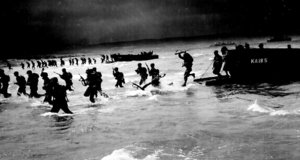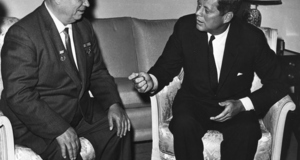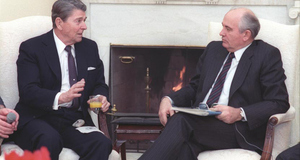Examining U.S. Foreign Policy, Refuting American Isolationism
By
2010, Vol. 2 No. 01 | pg. 1/1
KEYWORDS:
From before its birth to the present, the expansion of US power has been analogous to an ever-expanding hand upon the globe. Despite some of today's historically inaccurate politicians citing a revered past of non-interventionism and isolationism, the mainstay of American foreign policy has been one of expansionism and interventionism. Sparse periods of aloofness to the world are an anomaly rather than the norm. Hence, when the slogan “Bring America Back” rings out at various political campaigns, whatever is meant by it, it cannot mean a desire to return to a time when America was contained and minded its own business; for such a time never existed. The French Indian War in the mid 18th century defies all idealized visions of the colonist as being satisfied with the status quo of available land. At this time, “the most desirable lands within the boundaries of the old colonies were occupied” and “the obvious next stage was to expand farther west, beyond the Alleghany Mountains into the rich lands of the Ohio Valley” (Kagan, 17). Consequently the colonists, most notably Benjamin Franklin, pled to the King to take action against the French and their Indian allies. Impatient with British lack of response, in 1754 Virginia's governor sent the state's militia, led by Colonel George Washington, to create a fort at the forks of the Ohio River. This led to a small skirmish that the colonists won, only to be captured by a larger force of the French and their Indian allies, resulting in the French Indian War (Kagan, 26). The colonists had drug the England into a war for their own expansionist goals before seceding from the British Empire. One of the most often quoted foreign policy speeches where isolationists believe they find their roots is George Washington’s Farewell Address in which he speaks of a wariness of becoming involved in other nations. The Cato Institute's Vice President of Defense and Foreign Policy Studies, Ted Carpenter, wrote an article ten years ago titled, “Beware of Foreign Entanglements”. In this article he warned against trying to resolve the disputes of Eastern Europe at the time, to which he referred to as “nation building”. Criticizing United States' close ties to Israel, Chattanooga writer Rich Beecher also cites The Farewell Address and arrived at the conclusion, “Just as Washington points out that the interests of Europe are not necessarily the same as our own, neither are those of any particular Middle East country (“Beware of Foreign Entanglements”).Yet if one is to understand what Washington meant, his statements cannot be viewed in a contextual vacuum. For such a view only allows the politicization of the Farewell Address whenever it becomes convenient. In 1796, the young United States was in the middle of French and British hostilities and could have potentially have been destroyed by another war with either country. Each side sought America as an ally. That same year “the French Minister in Philadelphia had warned that in the coming election Americans must choose friendship with France and confrontation, perhaps war” (Kagan, 113). Washington, who feared the country's favoritism of France and their revolutionary ideals that turned sanguine, said to Hamilton, “The people of this country, it would seem, will never be satisfied until they become a department of France: it is my business to prevent it” (Kagan, 113). A foreign entanglement with France at the turn of the century may have caused the end of the United States. Washington's Farewell addressed specific, pressing issues of the time and, by no means, acted as a future foreign policy blueprint. At the GOP's first presidential debate for '08, Republican Congressman of Texas, Ron Paul, when asked why he was the only Republican to vote against the invasion of Iraq in 2002 responded, “I'm suggesting very strongly that we should have a foreign policy of nonintervention.” He went on to say, “No nation building. Don't police the world. That's a conservative, it's a Republican, it's a pro-American, it follows the Founding Fathers” (International Herald Tribune). Contrary to the Congressman's assertions, not only did one of the Founding Fathers double the size of the United States through the purchase of the Louisiana Territory, but he also had the US navy police the Mediterranean Sea during his presidency. Jefferson acted antithetically to Ron Paul's conception of the Founding Fathers by refusing to allow the Barbary Pirates to steal and ransack American and European trading vessels by using the military to insure their protection (Kagan, 98). Further shattering the perception of early American isolationism, Jefferson granted permission to the American consul of Tunis, William Eaton, to launch a mission to overthrow the Barbary ruler of Tripoli, Qaremanli. This North African ruler had been, before the arrival of American navy to the Mediterranean, making demands on commercial ships that the Barbary pirates enforced. Ultimately, William Eaton's “adventure” failed but “taught the Europeans that the United States „would not turn the right cheek when the left has been smitten'” (Kagan, 100). Often members of presidential administrations and the military do not view every foreign threat from the same vantage point. When Colin Powell told the United Nations where US intelligence believed Saddam was hiding weapons of mass destruction, he had doubts. In 1818, when the Secretary of State, John Quincy Adams, heard of Andrew Jackson's “questionably authorized” invasion of Spanish Florida, he had to convince the Monroe Administration's cabinet, who were ready to apologize to Spain “that the United States ought not to apologize for what happened but rather take advantage of it” (Gaddis, 17). Adam's argued that since Spain could not control their territory and prevent cross border attacks by “Creeks, Seminoles, and escape slaves” (Gaddis, 17), then they should allow the United States to take over the territory to fill the “power vacuum” (Gaddis, 17). The United States' expansionist aims continued through the mid 19th century then ebbed a decade before and during the Civil War. Ostensibly, the Mexican-American War was fought over the border of Texas and Mexico: the Mexicans believed it lay 150 miles north of the Rio Grande at the Nueces River, and the United States believed it was the Rio Grande. Yet President James K. Polk had far wider expansionist goals: “on the night of his inauguration, he confided to his Secretary of the Navy that one of his main objectives was the acquisition of California” (Zinn, 147). In early 1846, Polk ordered General Taylor to move troops to the Rio Grande; it was clear he sought hostilities to which the acquisition of California would result. Two years later, with the US victorious over Mexico, Polk had what he had sought after: the entire present-day Southwest and California. Nevertheless, there was strong Republican opposition during the war, less because they were averse to expansion, but were hostile to acquiring more slave states. Congressmen Abraham Lincoln, tried to prove that the President created the war to satisfy his southern Democratic base, challenging “Polk to specify the exact spot where American blood was shed „on American soil' ” (Zinn, 151). During the decade preceding the Civil War, US expansionist ideas further ruptured at the Mason-Dixon Line. In the 1850's the South was alarmed by the Spanish policy in Cuba, “decreeing that all slaves brought into Cuba after 1835 – a large portion of the total slave population – should be freed” (Kagan, 240). The Pierce Administration was nearly swayed by Southern Democrats to invade Cuba for the sake of restoring slavery, in hopes that American slaves would not be inspired to revolt. Even more radical pro-slavery Southerners “wanted to carve new slaves states out of Mexico” (Kagan, 237). In the end, Pierce was dissuaded from acting upon these ideas for fear of losing Northern Democratic support. It was only six years after the Civil War ended that America again sent its military overseas. Much like Matthew Perry forcibly opened Japan to American commerce in 1853, “in 1871, (Secretary of State) Fish dispatched Fredrick Low to Korea, accompanied by several gunboats” and effectively did the same to this “hermit kingdom” (Kagan, 331). Korea had been under a tributary system of China, but as Korean independence seekers grew in number, Japan moved in to take advantage of the disorder in 1894. At the time, the United States' was the only country that viewed Korea as independent. Seeing Japan as trying to provoke China into war and use Korea as a pawn, Secretary of State for the Cleveland Administration, Walter Q. Gresham, “sent an angry note to Japan, criticizing it for refusing to withdraw its troops from Korea” and hoping that independence would be respected (Kagan, 334). A nation that held a non-interventionist policy would neither force trade upon a nation nor attempt to protect its sovereignty. Nor would an isolationist country protest the treatment of another nation's citizens by their own ruler. For instance, Russia's Alexander III sent thousands of Jews, dissidents, opposition members to prison in Siberia in the 1880's and 1890's. Not only did the US government protest to these oppressive policies but the Democratic Party campaigned on the issue: “in the interest of justice and humanity....to use its prompt and best efforts to stop these cruel persecutions in the dominions of the Czar and to secure to the oppressed equal rights” (Kagan, 289). Though American interventionism is often shaped by concern for justice and equality, it is perhaps more frequently shaped by strategic and commercial interests. Before mid January 1893, the Hawaiian Kingdom was a sovereign country ruled by Queen Liliuokalani. After she decided to “redress the balance” (Kinzer, 9) in favor of the native Hawaiians, John Colburn and Lorrin Thurston persuaded American minister, John L. Stevens to back up a bloodless coup overthrowing the Queen. With 162 American soldiers, indigenous Hawaiian cabinet members realized it was futile to resist and fruit producer Sanford Dole was installed as the country's President (Kinzer, 29). Five years later Hawaiian officially became US territory. The explosion of the USS Maine gave the United States a much sought after reason to go to war with Spain, for “Cuba had exerted a hold on the American imagination for many years, at least since Thomas Jefferson wrote of his hope that it would one day become part of the United States (Kinzer, 46).” From America's victory in the Spanish-American War, Puerto Rico; Cuba; and the Philippines were in US possession. Puerto Rico and the Philippines became US territories, for Cuba, the Platt Amendment was passed that, “in essence....gave Cubans permission to rule themselves as long as they allowed the United States to veto any decision they made” (Kinzer, 43). This invasive amendment, just as the overthrow of Iranian leader Mossadegh in 1953, would come to haunt the United States at a later date: Fidel Castro and Iranian Revolution of 1979. For three and a half years the United State's military fought an insurgency in the Philippines that has often been compared, even by the current President, to Iraq (“From Manila to Baghdad”, Slate.com). After fighting with the Filipinos against Spain, President McKinley decided that instead allowing them sovereignty, they would be Christianized, despite most Filipinos already being Catholic (Kinzer, 47). In response, the Filipino rebels, under the leadership of Emilio Aguinaldo, fought for years only to be subdued in the summer of 1902. Around the same time in Central America, the United States virtually created a country. What is known today as Panama was at the turn of 19th century part of Columbia. Yet because Columbia refused to grant United States land where the Panama Canal was to be dug, Theodore Roosevelt ignited a Panamanian revolution. He did this by encouraging dissidents to declare sovereignty, then the American would “quickly give them diplomatic recognition, and then use American troops to prevent the Columbian army from reestablishing control” (Kinzer, 61). Just seven years later to the north, the United States orchestrated another revolution in Nicaragua that would oust President Zelaya. Secretary of State Henry Knox had close ties with businesses operating in the country such as La Luz mining company and Bluefields that Zelaya refused to give free rein. Zelaya had also tried to wean his country's financial dependence away from US banks. His punishment was exile and the American friendly leader, General Estrada, was installed (Kinzer, 70). After frequent attacks from German U-boats, the United States fought the Central Powers in World War I. During signing of the Treaty of Versailles to end the war, President Wilson drafted the League of Nations to insure that such a world wide conflict would not occur again. Nevertheless, the United States' Congress did not pass it and America and its European allies drifted into what could accurately be considered isolationism, non-interventionism, and timidity. This irregular two decade period of non- interventionism was due to the fear of another world conflict and the Great Depression; allowing German Nazism and Italian fascism to go unchecked. In the time since World War II, few contemporaneous isolationists claim that the United States has held a foreign policy of non-interventionism. The CIA and US government has overthrown foreign leaders like Mossadegh of Iran and funded wars that the majority of general public are not likely to be aware of. In addition, conventional wars have been launched against North Korean aggression, the Viet Cong, and Iraq's army in Kuwait. US forces also have been heavily involved in NATO operations in the Balkans and with the UN in Somalia. The current decade, overthrowing the Taliban in Afghanistan and invading Iraq, is simply a continuation of foreign policy. American foreign policy varies from that of a benevolent republic, to a Machiavellian strategic polity, to a commerce-inspired policeman. The United States not only believes that its ideals of liberty, choice, and equality should apply to all, but like all “rising powers throughout history” America has always had an “expanding sense of both [its] interests and entitlements” (Kagan, 304). Ideals and interests are interwoven tightly into American foreign policy, creating an expansion driven, interventionist nation. To deny this is to scorn history. Beecher, Rich. “Beware of Foreign Entanglements”. The Chattanoogan.com. March 2, 2006. 4 May 2007. http://www.chattanoogan.com/articles/article_81336.asp. Carpenter, Ted Galen. “Beware of Foreign Entanglements”. Cato Institute. June 5, 1997. 4 May 2007. http://www.cato.org/dailys/6-05-97.html. Gaddis, John Lewis. Surprise, Security, and the American Experience. Cambridge, MA: Harvard University Press, 2004. Kagan, Robert. Dangerous Nation. New York, NY: Alfred A. Knopf, 2006. Kaplan, Fred. “From Baghdad to Manila”. Slate.com. Oct. 21, 2003. 5 May 2007. http://www.slate.com/id/2090114/. Kinzer, Stephen. Overthrow: America's Century of Regime Change from Hawaii to Iraq. New York, NY: Henry Holt and Company, 2006. “Transcript: The Debate.” International Herald Tribune. May 3, 2007. 4 May 2007. http://www.iht.com/bin/print.php?id=5562636. Zinn, Howard. A People's History of the United States. New York, NY: Harper & Row, 1980. Suggested Reading from Inquiries Journal
Inquiries Journal provides undergraduate and graduate students around the world a platform for the wide dissemination of academic work over a range of core disciplines. Representing the work of students from hundreds of institutions around the globe, Inquiries Journal's large database of academic articles is completely free. Learn more | Blog | Submit Latest in History |


















